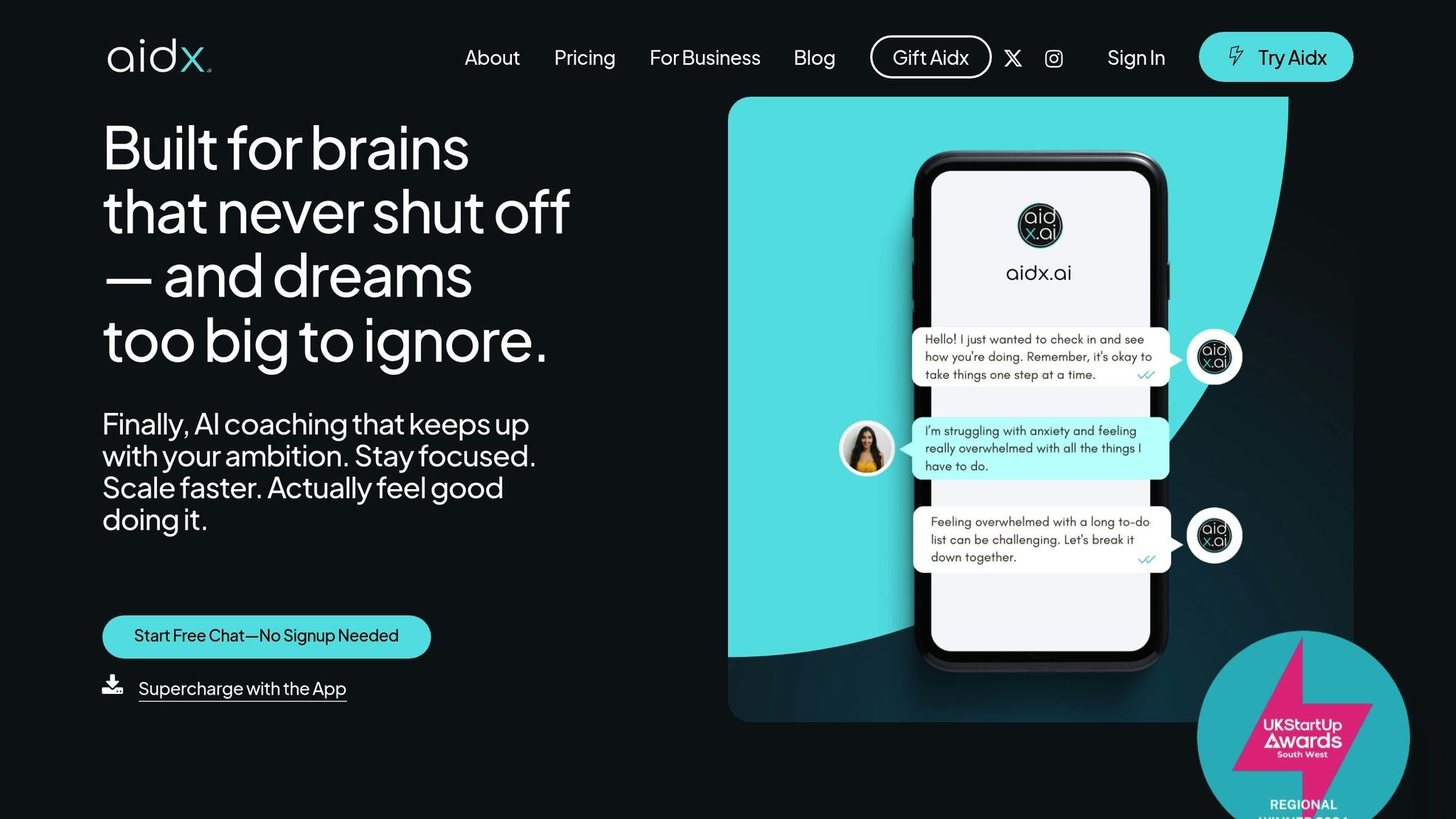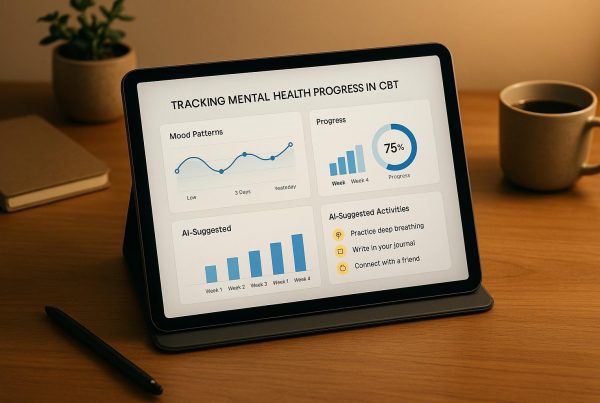Want to handle life’s challenges better? A growth mindset and resilience are your best tools. These traits help you turn failures into learning opportunities, stay persistent, and bounce back stronger from setbacks. Here’s what you need to know:
- Growth Mindset: Believing abilities can improve with effort. It helps you see challenges as opportunities, not threats.
- Resilience: The ability to adapt, recover, and keep going through tough times.
Key Takeaways:
- People with a growth mindset and resilience experience less stress, anxiety, and depression.
- Resilient individuals live longer and maintain a more optimistic outlook.
- Tools like journaling, feedback, and daily habits can help you build these traits.
Ready to learn how to develop these skills and apply them to your life? Let’s dive in.
Rewire your brain for growth, resilience & confidence: Gregory Walton, Ph.D.
Understanding Growth Mindset and Resilience
Before diving into practical strategies, it’s important to grasp the concepts of growth mindset and resilience – two key tools for navigating life’s challenges.
What Is a Growth Mindset?
A growth mindset is the belief that intelligence and abilities can improve through effort, learning, and persistence [5]. Psychologist Carol Dweck introduced this concept, contrasting it with a "fixed mindset."
In a fixed mindset, people see intelligence as static and unchangeable [2]. They focus on looking smart, which often leads to avoiding challenges, giving up easily, ignoring feedback, and feeling threatened by others’ achievements [5].
On the other hand, those with a growth mindset view challenges as opportunities to grow. They believe that abilities can be cultivated over time. Dweck explains:
"Students understand that their talents and abilities can be developed through effort, good teaching, and persistence" [5].
Here’s a quick comparison of the two mindsets:
| Growth Mindset | Fixed Mindset |
|---|---|
| Believes intelligence and talent can grow with effort [5] | Sees intelligence and talent as fixed [2] |
| Welcomes challenges as opportunities to learn [4] | Avoids challenges [5] |
| Perseveres through setbacks [4] | Gives up when things get tough [5] |
| Values feedback as a tool for improvement [4] | Dismisses or ignores feedback [5] |
| Draws inspiration from others’ success [4] | Feels threatened by others’ success [5] |
The impact of mindset is profound, influencing how we approach everything from work to personal relationships.
What Is Resilience?
Resilience is the ability to adapt, recover, and keep moving forward in the face of challenges [2]. It’s not about avoiding hardships or pretending they don’t affect you. Instead, resilience helps you process difficulties and bounce back, all while maintaining your sense of purpose and emotional health.
Think of resilience as a mental shock absorber. When life throws unexpected challenges your way – whether it’s a loss, failure, or major change – resilience helps you navigate those moments without losing your footing.
Research from Harvard University links resilience to longer life spans and a brighter outlook on life [3]. Resilient people actively work to protect their mental and emotional well-being, even during tough times.
Resilience involves several key elements:
- Adaptability: Adjusting your approach as circumstances shift.
- Recovery: Bouncing back after setbacks.
- Growth: Using challenges as opportunities to become stronger.
- Perspective: Viewing difficulties as temporary and manageable.
Elizabeth Edwards captures this idea beautifully:
"Resilience is accepting your new reality, even if it’s less good than the one you had before" [7].
This mindset encourages working with what you have instead of resisting what can’t be changed. Up next, let’s explore how a growth mindset strengthens resilience.
How Growth Mindset Builds Resilience
Growth mindset and resilience don’t just complement each other – they actively reinforce one another. A growth mindset lays the foundation for resilience by encouraging a positive, proactive approach to challenges [2].
When you believe that abilities can be developed, setbacks become opportunities to learn instead of reasons to quit [6]. Here’s how a growth mindset supports resilience:
- Reframe Setbacks as Learning Opportunities: View failures, negative feedback, or obstacles as chances to grow [1]. For example, instead of seeing a job rejection as proof of inadequacy, focus on what you can improve for future opportunities.
- Encourage Persistence: A growth mindset inspires the determination needed to overcome adversity [6]. Believing in your potential to improve keeps you motivated, even when progress feels slow.
- Reduce Threat Perception: By seeing challenges as opportunities rather than threats, a growth mindset lowers the emotional strain of tough situations [1].
- Develop Problem-Solving Skills: Use setbacks as constructive feedback to refine your approach and enhance your problem-solving abilities [2].
Resilience, in turn, reinforces a growth mindset. Each time you successfully adapt to a challenge, you gather evidence that growth and progress are achievable [8].
Michelle Obama summed it up perfectly:
"Failure is an important part of your growth and developing resilience. Don’t be afraid to fail" [3].
This perspective shifts failure from something to fear into a stepping stone for personal growth and resilience.
Practical Strategies to Develop a Growth Mindset
Here are some practical ways to shift your perspective and build resilience that lasts.
View Challenges as Learning Opportunities
When faced with a tough situation, try looking at it as a chance to grow. Ask yourself three key questions: "What can I learn from this?", "How can this make me stronger?", and "What new skills or perspectives can I gain by working through this?" [9]. This shift in thinking helps you move from feeling defensive to embracing a mindset focused on learning.
Mindfulness expert and performance coach George Mumford explains:
"The stress that comes with challenges and hardship is crucial for growth. We just have to know how to use it positively." [10]
Breaking big challenges into smaller, more manageable steps can help you keep up your momentum [9]. Reflecting on past obstacles you’ve overcome can also remind you of the skills and insights you’ve gained along the way [9]. As Oprah Winfrey wisely says:
"Challenges are gifts that force us to search for a new center of gravity. Don’t fight them. Just find a different way to stand." [11]
Once you’ve tackled a challenge, take time to reflect on the experience and use it to fuel further growth.
Reflect and Learn from Setbacks
Reflection isn’t just about analyzing what went wrong – it’s about learning lessons that can guide your future decisions [12]. Take time to examine both your successes and failures with curiosity rather than judgment.
Journaling can be a great tool for this. Write down what worked, what didn’t, and why [12]. This process can help you spot patterns and identify areas for improvement. When setbacks happen, approach them with curiosity instead of self-criticism. Writing about your thoughts and fears can help you turn vague worries into specific, solvable problems [13].
Ralph Smedley offers a helpful perspective:
"Failure is only the opportunity to begin again, this time more intelligently." [12]
Feedback from others can also be invaluable. Seek input from mentors or peers – they can often spot things you might miss [12].
Focus on Effort and Progress, Not Perfection
Aiming for perfection can be overwhelming and counterproductive. Instead, focus on consistent effort and steady progress. Celebrate the process, not just the outcome, because real change takes time.
Concentrate on what you can control – your effort, attitude, and actions – and practice gratitude for the growth that comes through challenges [9] [10]. Remind yourself that both pain and pleasure are temporary. Don’t let your current circumstances define you [10]. If obstacles force you to change plans, see it as an opportunity to reassess and set new goals [9]. Flexibility becomes a strength when you prioritize progress over perfection.
Ask for and Use Feedback
Feedback is a powerful tool for growth, but it requires the right mindset. Instead of viewing feedback as criticism, see it as an opportunity to improve.
When asking for feedback, try something simple like, "What’s one thing I could do better?" Listen carefully without defending yourself, take notes, and ask questions if you need clarification. Show appreciation for the feedback, and focus on implementing one or two actionable changes at a time. This approach ensures steady improvement without feeling overwhelmed.
Build Growth-Focused Daily Habits
Daily habits play a huge role in shaping your mindset and building resilience over time [15]. Small, consistent actions can lead to big changes.
- Start your day with a 5-minute gratitude journal and set clear intentions [15]. This helps you begin on a positive note.
- Practice mindfulness by paying attention to emotional triggers and physical sensations [15]. This awareness allows you to respond thoughtfully rather than react impulsively.
- Use breathwork during stressful moments to calm your mind and body [15]. Deep breathing can improve focus and clarity under pressure.
- Set one small goal each morning that aligns with your bigger aspirations [15]. Achieving this goal can create momentum for the rest of your day.
- End your day with a gratitude reflection, focusing on what went well instead of what didn’t [15]. This practice trains your brain to see the positives, even during tough times.
You can also try habit stacking – pairing new habits with existing routines. For example, practice a brief breathing exercise while waiting for your coffee to brew. Build a support system by regularly checking in with a friend or mentor [15]. Strong connections can provide encouragement during challenging times.
As Carol Dweck puts it:
"The hand you are dealt is just the starting point for development." [14]
Start by choosing one or two strategies that resonate with you. Practice them consistently for a few weeks, and then gradually add new habits. Over time, these small changes can lead to a more resilient and growth-oriented mindset.
sbb-itb-d5e73b4
Using Tools and Support Systems for Resilience
Building resilience often starts with daily habits, but the right tools and support systems can take it to the next level. By combining structured approaches with technology, you can stay consistent and navigate challenges more effectively. This blend of strategy and innovation ensures resilience becomes part of your everyday life.
Why Self-Monitoring and Goal-Setting Matter
Tracking your progress and setting clear goals are key to reinforcing a growth mindset. Self-monitoring helps you spot patterns, identify what works, and refine your approach, while goal-setting ensures your efforts are focused and intentional.
Studies show that people who regularly track their emotional states, confidence, stress levels, and performance metrics experience faster personal growth. This data-driven approach not only holds you accountable but also provides solid evidence of your progress – especially during times when it feels like you’re not moving forward.
Digital tools like Aidx.ai can make this process even smoother by integrating these practices into your daily routine, offering consistent support to strengthen your resilience.
How Aidx.ai Supports Personal Growth and Resilience

Aidx.ai, an AI-powered coaching platform, is designed to help you tackle real-world challenges while fostering resilience. Recognized as AI Startup of the Year by the UK Startup Awards (South West), it’s tailored for those aiming to cultivate a growth mindset with accessible, ongoing support.
One standout feature is its voice-enabled interface, allowing for natural, hands-free conversations. Whether you’re walking, driving, or simply need immediate guidance, Aidx.ai delivers coaching in the moment – no waiting for scheduled appointments.
The platform also includes a planner that transforms insights into action through goal-setting, reminders, and gentle nudges. This keeps your growth plans on track, even when life feels overwhelming.
Hali, a Strength & Mobility Coach, shared her experience with Aidx.ai:
"I got sucked into the conversation like I was talking to an educated & empathetic therapist & every suggestion sent me to where I needed to go." [16]
Aidx.ai offers specialized modes for various situations. For instance, Microcoaching mode provides quick, focused 5-minute sessions, ideal for busy professionals seeking clarity during stressful moments. Meanwhile, Embodiment mode helps you visualize and physically connect with your future goals, boosting confidence for tackling new challenges.
Its self-monitoring system tracks emotional states, confidence, stress, anxiety, and performance metrics, giving you a clear picture of your progress. This reinforces the idea that growth comes through consistent effort and practice, making the journey both measurable and rewarding.
Using Evidence-Based Techniques Through AI
Consistency is key when applying evidence-based methods, and Aidx.ai’s Adaptive Therapeutic Intelligence (ATI) System™ ensures just that. By leveraging proven techniques like CBT, DBT, ACT, NLP, and performance coaching, the platform adapts to your evolving needs, offering personalized support that grows with you.
Much like a human coach, Aidx.ai learns from your interaction history, tailoring its responses to suit your unique challenges. This personalized approach ensures you’re always working with strategies that align with your goals while introducing new methods as you advance.
The impact of AI tools like Aidx.ai is evident in organizational settings, where companies have reported a 31% drop in workplace stress, 28% fewer burnout-related departures, a 19% boost in productivity, and a 36% increase in resource utilization compared to traditional mental health options [17]. These results highlight the value of accessible, adaptable support systems.
Dr. Emily Harrington, a workplace mental health expert, emphasizes the importance of ongoing support:
"The most successful organizations understand that mental fitness is a continuous practice, not an emergency response. Daily mental conditioning builds resilience long before stress becomes distress." [17]
Accessibility is another major advantage. 75% of people are open to AI-driven mental health support [16], and AI therapy is 80% more affordable than traditional sessions [16]. This makes it easier to maintain consistent support without the financial barriers that often deter people from seeking help.
For those who value privacy, Aidx.ai includes an Incognito mode, where sessions delete automatically after 30 minutes. All data is encrypted and GDPR-compliant, ensuring your conversations remain secure and confidential.
Common Challenges in Building a Growth Mindset
Developing resilience through a growth mindset isn’t just about creating better habits – it also means tackling internal challenges that can slow progress. Building this mindset often involves facing obstacles that might derail your efforts. Understanding these hurdles and having ways to address them can make all the difference between giving up and achieving meaningful change.
Identifying and Changing Negative Self-Talk
Negative self-talk is that inner voice that criticizes, doubts, and questions nearly every step we take [20]. This internal critic reinforces fixed beliefs, which can block growth and progress.
To tackle this, start by writing down recurring negative thoughts in a journal, especially during tough times [20]. Once you’ve identified these patterns, challenge their accuracy. Are these thoughts based on facts, or are they driven by emotions? Then, work on reframing them. For instance, instead of thinking, "I can’t do this anymore!" try, "I’ll give it another shot tomorrow" [20].
Mindfulness can also help you catch these thoughts before they take over. Practicing mindfulness techniques increases awareness of your emotions and thinking patterns, making it easier to replace negative messages with positive affirmations. Eckhart Tolle, in The Power of Now, described realizing that his negative self-talk wasn’t who he was – it was simply a stream of thoughts he could observe [22]. Treating yourself with kindness and practicing self-compassion during setbacks also helps shift your inner dialogue toward growth [21].
Once you’ve addressed negative self-talk, the next challenge to confront is the fear of failure.
Managing Fear of Failure
The fear of failure can often stop people from even trying, stifling growth before it begins. The key is to see failure differently – not as something to avoid, but as a natural and valuable part of learning. Every mistake or setback is a chance to gather insights and improve [23].
Thomas Edison summed this up perfectly when he said:
"I have not failed. I’ve just found 10,000 ways that won’t work" [24].
This mindset reframes setbacks as stepping stones toward success. Adopting a beginner’s mindset – approaching challenges with curiosity and a willingness to learn – can help replace fear with a sense of possibility [23]. Instead of viewing setbacks as proof of inadequacy, treat them as feedback to refine your approach and build new skills [24].
Another way to manage fear is by intentionally seeking out small, low-stakes failures. These experiences can gradually reduce your sensitivity to rejection and help you let go of perfectionism. Shifting your focus to progress rather than perfection encourages steady improvement [24]. Talking about your fears with a trusted friend, mentor, or therapist can also provide valuable perspective and support [23]. And by concentrating on what’s within your control, you can direct your energy toward actions that truly matter [25].
With fear and doubt in check, accountability becomes a crucial tool to sustain growth.
Staying Motivated Through Accountability
Accountability, when approached with a growth mindset, is a powerful way to stay on track and build resilience. It helps you take ownership of your actions and focus on solutions rather than placing blame on circumstances or others [18].
Start by setting clear, achievable goals. When mistakes happen, see them as chances to learn and improve rather than reasons to criticize yourself [18]. Tools like Aidx.ai can assist by tracking your progress and providing regular check-ins, helping you notice growth patterns that might otherwise slip by [18].
Building a support network of mentors and peers who share a growth-oriented approach can also make a big difference. Regular accountability and celebrating small victories help maintain momentum and reinforce your commitment [18]. As one perspective highlights:
"Accountability can be a powerful tool that lifts everyone involved, or it can be a source of guilt and shame" [19].
Conclusion: Building a Resilient, Growth-Oriented Life
Creating a resilient, growth-focused life is an ongoing process that reshapes how you tackle challenges and navigate your path forward. The strategies shared in this guide provide a strong foundation for personal development and emotional strength.
When you adopt the mindset that abilities can grow through effort and dedication, you’re not just transforming your own life – you’re also impacting those around you. This shift in perspective creates a ripple effect, benefiting everyone in your circle.
Take the first step today. Start by reframing a current challenge. Ask yourself, "What can I learn from this?" or "What skill am I building here?" [8]. Add the word "yet" to your inner dialogue to remind yourself that setbacks are temporary. For instance, swap "I’m not good at presenting" with "I’m not good at presenting yet."
As Dr. Carol Dweck wisely said:
"Mindsets are just beliefs. They’re powerful beliefs, but they’re just something in your mind, and you can change your mind" [27].
Consistency is key. Consider keeping a growth journal to jot down daily reflections [8]. Focus on process-driven goals that prioritize habits and effort over outcomes. Step outside your comfort zone regularly – whether that means sticking to a gym routine, eating better, or asking for help when needed [28].
To stay on track, take advantage of tools designed to support your journey. Platforms like Aidx.ai offer real-time guidance to help you build and reinforce habits every day. With 75% of people open to AI-driven mental health support and AI therapy costing 80% less than traditional options, accessible help is more available than ever [16]. Aidx.ai’s Adaptive Therapeutic Intelligence system tailors its advice based on your goals and past interactions, using proven methods like CBT, DBT, and NLP. It’s available 24/7 on platforms like voice chat, web, or Telegram [16].
Even during tough times, a growth mindset proves its worth. A 2020 study revealed that individuals with this mindset experienced lower rates of depression and anxiety during the COVID-19 pandemic [26]. It’s a powerful reminder that this approach works, even in the most challenging circumstances.
By combining your efforts with supportive tools, the path ahead becomes clearer. Embrace challenges as opportunities to learn, persist through setbacks, focus on effort over perfection, and surround yourself with people who share your commitment to growth. As Michelle Obama beautifully said:
"Failure is an important part of your growth and developing resilience. Don’t be afraid to fail" [3].
Your journey toward a resilient, growth-oriented life begins with your next decision. Choose to see today’s struggles as tomorrow’s strengths, and watch how this perspective changes everything.
FAQs
How can I use a growth mindset to handle personal setbacks effectively?
To approach personal setbacks with a growth mindset, start by shifting how you see failures. Instead of viewing them as definitive defeats, try to see them as chances to learn and grow. Take time to reflect on what happened, pinpoint lessons you can take away, and adjust your approach to tackle things differently moving forward.
Focus on setting small, attainable goals to regain confidence. Look for constructive feedback to fine-tune your strategies, and remember to practice self-compassion – being kind to yourself is key to staying motivated. When you treat challenges as opportunities to grow, you’ll find it easier to build resilience and come back stronger, with a clearer sense of purpose and determination.
What are some simple daily habits to build resilience during tough times?
Building resilience is all about cultivating small, steady habits that boost your mindset and emotional health. Start by nurturing supportive relationships, practicing gratitude, and prioritizing self-care – whether that’s regular exercise, getting enough sleep, or managing stress effectively. A consistent morning routine, positive self-talk, and taking time to visualize your goals can also help you stay upbeat and flexible.
These practices lay the groundwork for emotional balance, sharper problem-solving, and a more hopeful perspective – all essential ingredients for resilience. By weaving them into your everyday life, you’ll find yourself better prepared to face challenges with confidence and a clear mind.
How does Aidx.ai help develop a growth mindset and build resilience?
Aidx.ai helps users cultivate a mindset geared toward growth and resilience by providing personalized coaching tailored to their individual needs. Through features like goal-setting, progress tracking, and real-time feedback, Aidx transforms personal development into practical, achievable steps. This approach keeps users aware of their progress and ready to adapt when faced with challenges.
The platform’s voice-enabled, privacy-focused design ensures that engaging with growth practices is both easy and stigma-free. Whether you’re dealing with difficult situations or working toward self-improvement, Aidx offers reliable, on-demand support to build resilience and encourage a focus on continuous learning.



